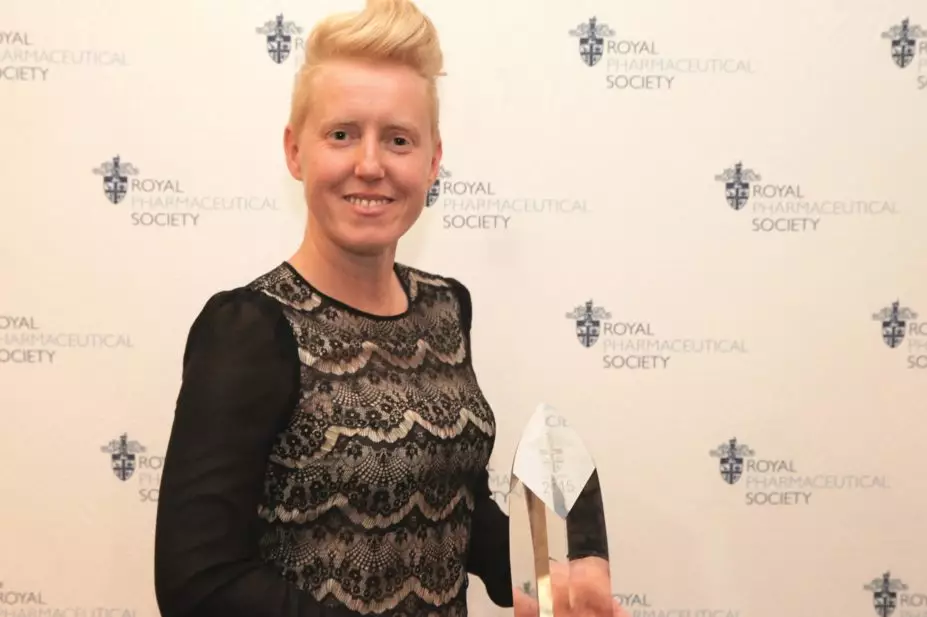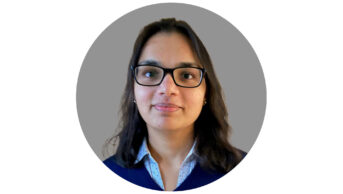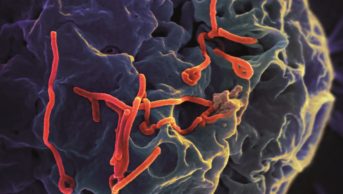
Royal Pharmaceutical Society
Having worked in pharmacy for more than 15 years, and co-founding two pharmaceutical science companies in the past two years, Claire Thompson has the credentials to be a role model for women in science. “You can’t be what you can’t see,” she explains, “regardless of your gender, if you can see people in positions that you would like to be and they’ve made it, you can too.” Thompson emphasises that she has never been subject to sexism in her career, but highlights the importance of professional female role models in helping women establish and achieve their aspirations.
Look up
It was serendipity that led Thompson to her first entrepreneurial opportunity, when she co-founded the company NanoScientium in 2014. “As these things generally happen, I had a chance meeting with a really bright scientist at a workshop a number of years ago. She was leading this workshop, and it became clear that there are significant gaps in where technologies are and the impact we could have on health,” Thompson explains. “We had a few moments to chat about what the potential gaps were and we thought there might be something in this.”
NanoScientium, which currently has two employees, is focused on bringing nanotechnologies to market. Thompson’s other enterprise, Agility Health Tech, was founded in June 2015 and is currently where she is spending most of her time and energy. The company helps clients to look at the technologies they have and develop strategies to bring them to market.
“My father taught me to play football when I was five and he said to me the difference between an average footballer and an exceptional footballer is the ability to look up,” she says. “They know where the ball is — the ball is at their feet! They need to look at where they are going to play the next pass, look at their opponents, look at their competition running towards them and think, ‘where am I going to put this ball? How am I going to win the game? And how am I going to communicate where this ball is going to?’”
“I now adopt that in my business life,” she continues. “We work with all our clients to help them to look up from the technology and look up from the data and think, ‘where is the next pass that I’m playing? Where am I putting this to? How I am going to get this into clinics? How am I going to get funding for this and how am I going to communicate what I do’”?
It is no coincidence that Thompson uses a football analogy — she was once an international player and still plays the game now. “I got my Northern Ireland call up when I was 17, so I played for their international side. It was phenomenal,” she recalls. When she left the country to study biochemistry at the University of St Andrews, she had to leave the team, too. “They didn’t have the funds in those days to fly people back and forth,” she explains.
However, being a student did not stop Thompson playing the sport. She captained the St Andrews team and led it to victory at the British Universities Shield. “I’m getting goosebumps just thinking about it,” she remarks. She took on the role of captain again while studying for her PhD at the University of Nottingham, and played for Ilkeston Town at the equivalent of championship level.
Large to small
It was during her PhD in pharmacy, which was sponsored by GlaxoSmithKline (GSK, then SmithKline Beecham), that Thompson initially became enamoured with the pharmaceutical industry. “I was just fascinated by how drug molecules were made and how we could use these to improve the health of folk worldwide. I felt like with that type of career I could have a positive impact on people’s lives. So that was me. From then on I was hooked on the industry and hooked on wanting to develop medicines,” she says.
Thompson began her career at Pfizer in Kent, working on inhaled drugs for asthma and chronic obstructive pulmonary disease, before moving onto GSK. She explains: “I spent five-and-a-half years working across chemical development and formulation development on a number of drug products for malaria, HIV, cancer, asthma – the lot,” adding that she was working on drugs at every phase of development.
“I was getting itchy feet and I went from GSK, which was a company of about 100,000–110,000 people, to a small contract research organisation called Molecular Profiles. It’s recently been taken over by Juniper Pharma. I was employee number 33, which was quite a contrast.” Thompson adds that the role was client facing, so she spent half her time leading a technical team, developing new services for the company, and the other half outselling those services. “You’re not working in silos in a big company, you are at the coal-face, so that was a real eye-opener for me.”
It was in her next position, at an even smaller virtual biotech company called Oxford PharmaScience, that Thompson encountered her biggest professional challenge. “I was employee number 4 and I was the only one who had a pharmaceutical background,” she recalls. Her role was to help the company transition from a food supplements and nutraceuticals company into an authentic pharmaceutical company. “I was still learning a lot about the commercial world but I was also trying to bring people with me on the journey. I had to explain: ‘I know you don’t want to have to go through all the regulation, but we just have to.’ Educating people around me along the way… was probably the biggest challenge, but the amount that I learnt was phenomenal,” she says.
In 2012, Oxford PharmaScience was identified as one of the top ten global emerging technology companies. “We were the only UK company to make that list,” emphasises Thompson, “we were extremely proud of that.”
A new hatstand
It was for her work at Oxford PharmaScience and, latterly, NanoScientium that secured the Royal Pharmaceutical Society (RPS) prize in pharmaceutical science for Thompson in September 2015. “I just can’t explain how proud of that I am,” she enthuses. “I brought my mum along for the ceremony on the off-chance that I won. There were tears. To be recognised by such a body is unbelievable.”
Thompson works closely with the RPS as chair of the Faculty Curricula Panel and, additionally, is the chief scientist of the Academy of Pharmaceutical Sciences, the professional body for pharmaceutical sciences in the UK. She also has honorary positions at the School of Medicine and Dentistry at the University of Birmingham and the School of Pharmacy at University College London. “As you can tell, I’ve got a hatstand on my Christmas list for all of these different hats,” she jokes, adding: “Sleep is for wimps!”
Despite all her accolades, Thompson is still most proud of completing her PhD. “It taught me a lot about myself,” she reflects. “I learnt how I work, how I like to work, and the things that I’m not very good at. It helped to focus my career goals going forward in terms of learning how to work on my own and learning how to plough through in difficult situations.
“Whenever I talk to student groups, they always ask me if they should do PhDs. It’s something that you’ve got to decide for yourself — it’s not something that you can have bestowed upon you,” she adds.
Inspiring others
Thompson also advises aspiring pharmaceutical scientists to accept the things they cannot change. “At some points in my career I’ve battled against things that I was never going to win,” she acknowledges, explaining that she believes she has got better at “recognising those things a bit earlier and thinking, ‘I’m not going to win this battle, I’ll leave it and use my energy elsewhere’.”
Her energy is currently devoted to growing her businesses, developing the RPS Faculty, promoting pharmaceutical science within the UK and being a role model for others. “If I can inspire folk to go into the industry, to go into the healthcare profession, to become footballers or entrepreneurs, then [that’s] fantastic.”


